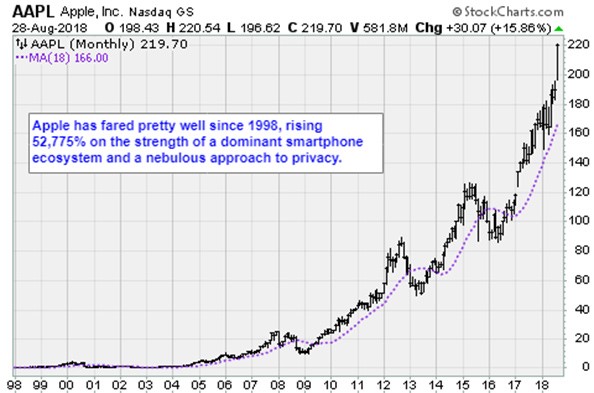I am making the case for investors to remain focused. See the real war for what it is. Buy Alphabet, Amazon.com and Facebook into weakness. While it may not seem so now, Apple has the weaker hand, writes Jon Markman, who's presenting at MoneyShow Dallas Oct. 3-4.
Privacy is the new battleground. Sounds simple, but it’s not. This war is really about the power of networks, and legacy vs. disruption.
Facebook (FB) reportedly pulled its iPhone data security app August 22, after Apple (AAPL) ruled the service violated its data-collection policy.
There is a good bit of irony involved. The social network is still reeling from its connection to fake news and the 2016 presidential election cycle.
Many members of the media immediately concluded that Facebook, and its lax stewardship of user data, was responsible for President Trump’s victory. In their zeal, they have become unwitting co-conspirators in more fakery.
Corporate managers, despite lip service, do not care about user privacy. And no company has mastered the charade better than Apple.
It’s no wonder that Cupertino’s finest is now building a strategy around privacy to mask its weaknesses.
In the age of software, the Cupertino company has become an apostle to hardware. Zealots crowd its glass-box stores to bathe in the magnificence of aluminum iPhones, iPads and Mac computers.
Most of its staunchest devotees are Chinese. Although Apple’s flagship iPhone X retails for $1,266 in China, it’s still the best-selling device.
In May, the company reported that fiscal second-quarter sales spiked 21% to $13 billion, about the same level as all of Europe combined. During the last four quarters, Apple logged $49.14 billion in sales from China.
There is no debate. Apple is succeeding in China. But oddly, its advocacy for user data privacy does not extend to the People’s Republic.
In February, Apple transferred the operation — including the security keys — of its Chinese iCloud service to Guizhou-Cloud Big Data.
That’s a big deal, since GCBD is a state-owned enterprise.
An even bigger deal is that the state is currently developing a social credit system for every man, woman and child.
Data culled from mass surveillance, social media, banking histories and personal devices will become the basis for a national reputation database.
This is every bit as dystopian as it seems.
The government is using the database to restrict movement and, in some cases, intern residents who have been identified as threats by predictive analytic models.
Apple is a willing party to all of this. By choice, the company does business in China.
In the West, Cupertino is often portrayed as a beacon of privacy rights.
The branding is both strategic and cynical.
Software companies pose a tremendous threat to Apple. Powerful cloud-computing networks, coupled with artificial intelligence and inexpensive sensors, are changing the way people interact with technology. Hardware, even the aspirational fare Apple makes, is getting abstracted away.
Although Apple revolutionized smartphones in 2007 with the iPhone, application services developed by Alphabet (GOOGL) and Facebook continue to dominate smartphone downloads.
And Amazon.com (AMZN) is building an important new network for personal digital assistants.

Forget Siri — Alexa is being fully embraced by car, consumer electronics and household appliance companies.
Collecting and understanding personal data is the common denominator for all of these new networks.
Apple managers would have us believe that, if we are not buying the product, we are the product. It’s clever, yet wholly self-serving given its Chinese business.
It’s also part of a larger fear, uncertainty and doubt — known in the industry as FUD — campaign to malign fellow network competitors.
Related story: Siri’s sorry state blinds Apple customers to greatness elsewhere
It is noteworthy that Onavo — the Facebook virtual private network app at the center of the current dustup with Apple — has been available as a free download on the App Store for several years. In exchange for protecting users’ identity as they browse, Onavo collects information about browsing habits and interactions with other apps.
As bad as it seems, it’s not like Facebook is looking the other way while a totalitarian regime adds users’ entire digital life to a database to determine if they are eligible for promotions, mortgages or travel.
Moreover, the privacy policy has not changed since 2013, when Facebook acquired the Israeli mobile analytics developer.
What has changed is Apple …
The company is fighting a misinformation war to impede the progress of the biggest, and most-successful software developers on its platform. Managers wisely understand that, ultimately, software and networks trump hardware.
I’m not suggesting investors sell Apple. This is not a bearish call. As long as the company can sell enough iPhones to buy back stock, shares are headed higher. Perhaps substantially so.
If Apple’s price/earnings multiple were to move to the low 30s, like many of its peers, the company’s market cap will exceed $3 trillion. (It’s currently at 20.)
I am making the case for investors to remain focused. See the real war for what it is. Buy Alphabet, Amazon.com and Facebook into weakness.
While it may not seem so now, Apple has the weaker hand.
Subscribe to Jon Markman’s Power Elite newsletter here
Subscribe to Jon Markman’s Tech Trend Trader here
Subscribe to Jon Markman’s Strategic Advantage here
I’ll be speaking at the Money Show Dallas Oct. 3-4. It will be a great show, with all sorts of experts sharing their insights. You can find more about that incredible conference by clicking here. I hope to see you there!





















